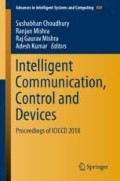Abstract
Ping-pong effect is inherent in handoff ready networks. Due to this effect, there are unnecessary handoffs in a wireless network, which reduces the energy efficiency and the quality of service (QoS) offered by the networks to the node under study. Ping-pong effect is also responsible for high delays in networks, due to the fact that the nodes and networks are constantly performing handoff operations, and thus the normal communication operations get delayed. This paper throws light on a novel cloud-oriented machine learning based approach which optimizes the number of handoffs in the network, and thus improves the overall QoS delivered by the network to the node. Our results imply that the ping-pong effect reduces by more than 20% when compared to standard handoff algorithms.
Access this chapter
Tax calculation will be finalised at checkout
Purchases are for personal use only
References
Alhabo, M., Zhang, L.: Unnecessary handover minimization in two-tier heterogeneous networks. In: 13th Annual Conference on Wireless On-demand Network Systems and Services (WONS), Wyoming, USA, pp. 160–164. International Federation for Information Processing (2017)
Mwanje, S.S., Mitschele-Thiel, A.: Distributed cooperative Q-learning for mobility sensitive handover optimization in LTE SON. In: IEEE Symposium on Computer and Communications (ISCC) (2014)
Kulkarni, M.P., Bale, V.S.: Vertical handoff decision algorithm to reduce unnecessary handoff for heterogeneous wireless networks. (IJCSIT) Int. J. Comput. Sci. Inf. Technol. 6(6), 5033–5036 (2015)
Chen, X., Tae Kim, K., Lee, B., Youn, H.Y.: DIHAT: differential integrator handover algorithm with TTT window for LTE-based systems. EURASIP J. Wirel. Commun. Netw. (Springer) (2014)
El Fachtali, I., Saadane, R., ElKoutbi, M.: Vertical handover decision algorithm using ants’ colonies for 4G heterogeneous wireless networks. J. Comput. Netw. Commun. (Hindawi Publishing Corporation) 2016, Article ID 6259802, 15 (2016)
Omoniwal, B., Hussain, R., Ahmed, J., Iqbal, A., Murkaz, A., Ul-Hasan, Q., Malik, S.A.: A novel model for minimizing unnecessary handover in heterogeneous networks. Turk. J. Electr. Eng. Comput. Sci. 26, 1771–1782 (2018)
Mahmood, A., Zen, H., Othman, A.K., Siddiqui, S.A.: An optimized travelling time estimation mechanism for minimizing handover failures from cellular networks to WLANs. In: 2015 International Conference on Estimation, Detection and Information Fusion (ICEDlF 2015), pp. 28–33 (2015)
Author information
Authors and Affiliations
Corresponding author
Editor information
Editors and Affiliations
Rights and permissions
Copyright information
© 2020 Springer Nature Singapore Pte Ltd.
About this paper
Cite this paper
Kene, P., Haridas, S.L. (2020). Reducing Ping-Pong Effect in Heterogeneous Wireless Networks Using Machine Learning. In: Choudhury, S., Mishra, R., Mishra, R., Kumar, A. (eds) Intelligent Communication, Control and Devices. Advances in Intelligent Systems and Computing, vol 989. Springer, Singapore. https://doi.org/10.1007/978-981-13-8618-3_71
Download citation
DOI: https://doi.org/10.1007/978-981-13-8618-3_71
Published:
Publisher Name: Springer, Singapore
Print ISBN: 978-981-13-8617-6
Online ISBN: 978-981-13-8618-3
eBook Packages: Intelligent Technologies and RoboticsIntelligent Technologies and Robotics (R0)

